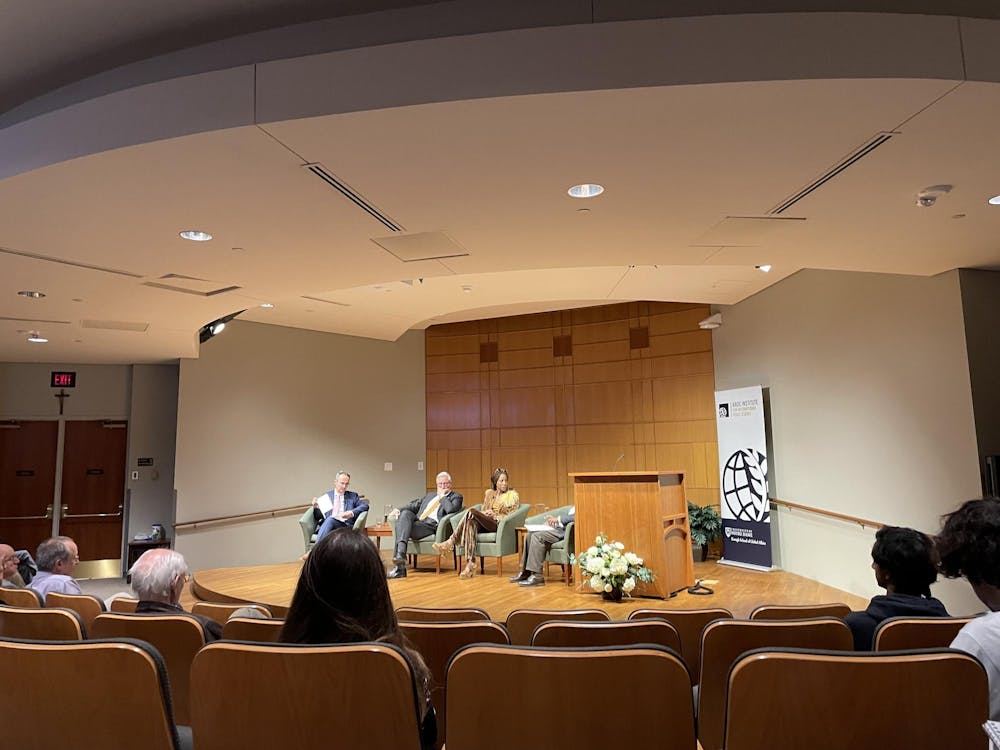Angélique Gakoko Pitteloud, a documentary filmmaker, writer and a survivor of the Rwandan genocide, and her husband, the Swiss ambassador to the United States, Jacques Pitteloud, spoke in the Hesburgh Center for International Studies auditorium Tuesday afternoon about the legacy of the Rwandan genocide. This year marks the 30th anniversary of the genocide in which approximately 800,000 of the minority Tutsi ethnic group were massacred during a roughly 100-day period in 1994.
In her remarks, Gakoko Pitteloud emphasized that while 30 years may seem like a long time to many people, it does not to her.
“Of course it was a long time ago, but for us it will always be like yesterday,” Gakoko Pitteloud said.
Gakoko Pitteloud recounted her harrowing experiences during the genocide, explaining that she hid under a neighbor's bed while her friend’s family lay dead on the street outside. She said three of her brothers, hundreds of her neighbors and approximately 80% of her closest friends were killed during the genocide.
“I was incredibly lucky to survive,” she said.
Gakoko Pitteloud escaped and joined members of her extended family in Switzerland, where she met her husband. Although she was able to escape the massacre, Gakoko Pitteloud stressed how the trauma of the event remains with her.
“[Genocide] destroys much more than human beings. You leave behind your innocence,” she lamented. "You are suddenly immersed into a world of fear, a world of pain, a world of loss [and] a world of nightmares.”
Nevertheless, Gakoko Pitteloud said she finds hope in those people who helped her survive.
“I have witnessed the saving grace of humankind: heroes and heroines filled with love, compassion and strength,” she stressed. “They stood up for us when everyone else ran away.”
Following Gakoko Pitteloud’s remarks, theology and peace studies professor Fr. Emmanuel Katongole and peace studies and global politics professor Ernesto Verdeja joined Pitteloud and Gakoko Pitteloud on stage for a conversation.
Pitteloud highlighted the importance of labeling the event a genocide and not simply a civil war or a sectarian conflict.
“Once we enter the phase of genocide, which I also witnessed, that's something totally different. It crosses all the red lines that one can imagine,” he said.
Pitteloud recounted of wanting to put the violence during the Rwandan civil war in 1993 which predated the genocide out of his mind when he was in the Swiss strategic intelligence service; however, the next year he was stationed in Rwanda when the genocide occurred.
“At some point evil always catches up with us,” he remarked.
Pitteloud put blame on the international community for failing to stop the genocide. He explained how the United States had plans to send paratroopers to Rwanda to try to put an end to the genocide, but never acted upon the plans.
“[The international community] failed the Rwandan people, we betrayed them. We just watched as hundreds of thousands of people were killed,” he said. “We have a collective moral responsibility.”
Gakoko Pitteloud emphasized the role art can play in helping people recognize each other’s common humanity.
“Art can help us all to understand, to humanize these victims not as a number,” she said.
Beyone helping people heal, Gakoko Pitteloud also stressed that preserving memory through art is necessary in order to prevent genocides from occurring again.
“If you don’t have the memory of the victims, you kill the victims twice,” she said. “History is the key so as to prevent things from happening again.”
While Gakoko Pitteloud turned to the arts after the genocide, Jacques Pitteloud explained he made it his mission to bring justice to Rwanda through international law.
“I realized [perpetrators] were not being brought to justice by anyone, and it blew my mind,” he said.
Jacques Pitteloud said he hopes prosecutions can prevent future injustices.
“I see signs of hope in the fact that we have established some sort of an international mechanism,” he said. “There is this growing awareness that we will not let crimes against humanity go unpunished, even if it takes 20 years, 30 years.”
In his concluding remarks, Pitteloud warned the audience to avoid the dehumanization that can occur in times of political polarization.
“Dehumanization starts by not accepting that other people can have different thoughts,” he said. “If there’s one lesson it’s the lesson of accepting each other, it’s the lesson of not characterizing the other side as animals.”
Editor's Note: A previous version of this article said that Jacques Pitteloud is the former Swiss ambassador to the United States. He is still in that position. We sincerely regret our error.










